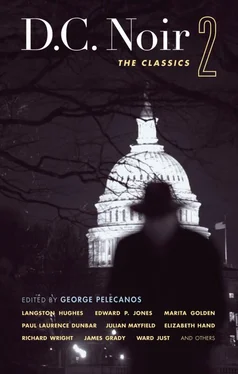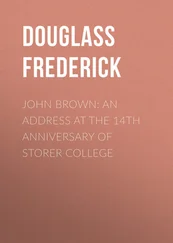“Your grades are not bad, Miss Frazier. I want to congratulate you on having been a good student. But it is essential that you obey the rules this institution …”
He found out!
“… It has come to my attention that you have violated my directive concerning proper use and conduct in the practice rooms.”
He had me.
“Now that you’re ready to graduate, you’ll need excellent departmental recommendations. And, Miss Frazier, I sincerely believe that all of us here want you to succeed in your chosen endeavors. But you must obey my rules, Miss Frazier … What is happening to civilization? You can play that other music in one of those terrible clubs on U Street. But your applications and general deportment as a student at this university indicate that you have higher aspirations … Keep those aspirations, my child; it is so easy for us, as a people, to fall prey to the baser aspects of human existence.”
Wow!
“Do you have anything to say for yourself, Miss Frazier?” He pressed his sleekly manicured fingers together to form a V, which seemed to point directly at my heart.
I got up slowly, barely able to speak. I bit down on my bottom lip to keep from breaking into tears. But I would not let him break me down. I mumbled some kind of something and excused myself as I groped my way out of there. A menacing, electronic curse whirred in the air. Somehow, I made it past Fannie and the other secretaries in the outer office. It was like an echo chamber in a Frankenstein movie … They said something about pink lingerie being dragged along the street as state troopers stood guard over the burning carcass of the city.
On the phone, she had a soft voice, with a lyrical sort of poignancy about it. It was clearly a different voice from the one she had at the rally; and now muted by the phone, it was a marvelous antidote to the whirring menace that continued to plague my memory of yesterday’s encounter with Dr. Reed.
“We’re having a party Friday night at our place on Ontario Road … Abdul said to call … So, how about it?”
“Thanks, but who’s Abdul?”
“You know him as Eugene … He’s changed his name.”
Why did he have to do that now? All of the fantasies churning within my young heart had Eugene and I on location in some distant erotic country. For a moment, I was angry with him for not sharing his transformation with me.
“Are you still there, Sister?”
“Yes,” I said, “I’m looking forward to meeting you in person … Eugene speaks very highly of you.”
It was a fantastic party!!! Where had all these people been hiding? Most of them were from the university, but I had never seen them before. There were colorful and zany students from the theatre department. Painters from the art department. Mad musicians who I didn’t even know existed. Two or three maverick professors from the English department — one, a woman with a red turban whose long brown arms danced in a circle of passionate wit. Where had all of these people been my four years at this university? There were revolutionary activists from Philadelphia, Cleveland, Detroit, and Harlem. There were different sets of people, all over the house:
In the living room, Jennie was engaged in a spirited debate on the need for a black revolutionary army. Jennie said that was suicidal because the masses had to be organized. The argument was fierce, but there was a great deal of laughter interspersed throughout.
Down in the basement, they were dancing to the music of Martha and the Vandellas, Mary Wells, the Supremes, and the mighty James Brown. In the corner of the basement, somebody passed me a joint, but I turned it down. I get silly and lose prospective when I smoke.
And in the kitchen, there were poets, at least ten of them. There was a thin dark string bean of a woman whose poetry reminded me of my granddaddy’s voice. It was so full of the earth and the sound of life as it is actually lived. The way it made you feel was more like music than literature. It was not like the poetry we studied in Dr. Brawley’s class. That poetry was “beautiful” (like most of my classical repertoire), but beautiful in a distant kind of way. The art of this poetry sprang from the urge to name things anew. As the old folks often said: This is the kind of food that sticks to the ribs. This poetry made you sing and laugh and weep and curse your enemies. Enemies? Who are our enemies? the poets asked.
Then Jennie’s turn came to read, her voice sometimes blazing with images of moribund worlds crumbling. In her poems, women and men died the romantic death of righteous revolutionaries, uttering inspiring slogans as they fought desperately and then died under the awesome firepower of the enemy. There was always something a little corny and sentimental about her concept of change; but that night I loved her poems uncritically. Yet something about her frightened me. She was so much freer than me. Her poems about being a woman, for example, were disturbingly erotic and daring.
And so we partied on into the night, some of us down in the basement shimmying to the music of Smokey Robinson; and others, like me, Jennie, and Eugene, in the kitchen digging on Coltrane while on the stove simmered big pots of peas and rice and spicy creolized stewed chicken.
In a quiet corner, away from the din, I tried to get acquainted with Jennie. I talked on and on about my musical studies; about whether or not I should go to the conservatory, or just get married and have a lot of babies. I went on about how I longed to see places like Paris and Vienna.
Suddenly, she interrupted me: “Don’t you have any commitment to anything other than yourself?” Her question stopped me dead. She was so smug with me then, and her voice was heavily weighted with a tone of moral and intellectual superiority. Yes, compared to her, I was confused about everything. Jennie seemed to have a firm grip on things.
Her family belonged to what she called the “responsible working class.” Her father was a railroad man whose overalls smelled of oil and coal. Her mother worked in a food processing plant in the Frankford section of North Philadelphia. She was the oldest of three children: a brother and a sister. By “responsible” she meant that they were never wards of the state.
They all worked hard. They paid the rent, and later the mortgage, on time. They voted. Did jury duty. Paid taxes. Made sure that there was food on the table. Stood over them while they did their school work. Read them good books. Scraped together money to take them to shows at the Pearl Theatre. And finally, kept them alive and out of jail.
So against all of my best intentions, that night we became friends.
“We need to make a revolution,” she said. “There’s no reason for people to have to live like our people do in this society. This system must inevitably fall. And upon its ashes we must build a new society … That’s what I’m about. What are you about, Sister?”
There was a sudden burst of laughter from the kitchen. I sat there kind of scramble-headed. But she was coolly and quietly arrogant as she waited for me to answer. What could I say that could even begin to compare with her grand apocalyptic visions?
Up until those weird dreams of which I have previously spoken, my life had seemed very ordinary and well made.
But I was not spoiled. No, I am not middle-class lace and frills. To be sure, by some abstract standard of accomplishment, we lived better than most Negroes. But my people have never made a big deal about it. You might call my people “conservative,” but it really wouldn’t mean anything to them. Because they hate oppression and degradation. They never put on airs, but they are certain that they can run this society better than most so-called white people. So life was no crystal stair for them. Like most black people, however superficially fortunate, they have had to claw and scratch for every crumb they could snatch from the white man’s table. With all of this in mind, I found the words to answer her.
Читать дальше











